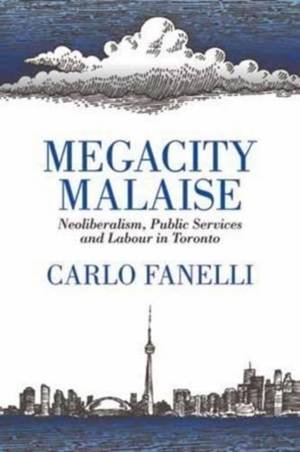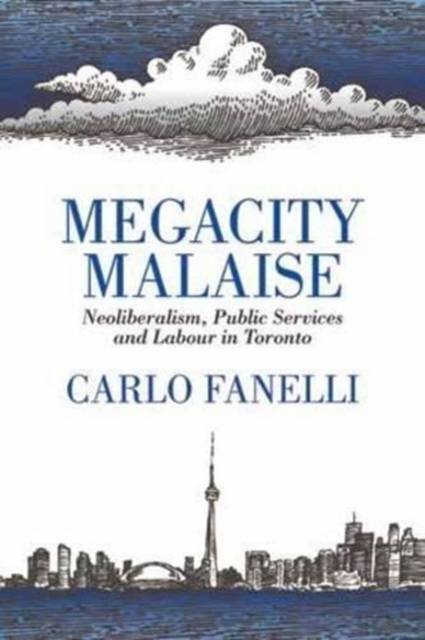
Bedankt voor het vertrouwen het afgelopen jaar! Om jou te bedanken bieden we GRATIS verzending (in België) aan op alles gedurende de hele maand januari.
- Afhalen na 1 uur in een winkel met voorraad
- Gratis thuislevering in België
- Ruim aanbod met 7 miljoen producten
Bedankt voor het vertrouwen het afgelopen jaar! Om jou te bedanken bieden we GRATIS verzending (in België) aan op alles gedurende de hele maand januari.
- Afhalen na 1 uur in een winkel met voorraad
- Gratis thuislevering in België
- Ruim aanbod met 7 miljoen producten
Zoeken
Megacity Malaise
Neoliberalism, Public Services and Labour in Toronto
Carlo Fanelli
Paperback | Engels
€ 35,95
+ 71 punten
Omschrijving
"[A] political economist with a gift- due to his not having forgotten his working class background- for bringing complex economic problems down to their real world implications for working people." - Jeff Noonan
"Fanelli does a very good job of demonstrating that the problem is not overpaid public sector workers, and that repeated demands for union concessions and more "flexible" work arrangements are misplaced." - Jim Silver Megacity Malaise documents how municipal governance, labour-management relations and public services have been transformed during the postwar period. Carlo Fanelli begins with an analysis of neoliberalism, exposing the underlying social and political causes of urban fiscal crises. Fanelli shows how municipal finances have been eroded to justify the policies of permanent austerity, which has led to a deterioration of public services and demands for concessions from civic workers based on the contention that they are unaffordable. Focusing on the post-amalgamation era at the city of Toronto, Fanelli draws on his experiences as a former city worker and trade unionist to make the case that a new municipal agenda infused with a sense of social and workplace justice is necessary to overcome mounting registers of social inequality. Alternative approaches to public policy must be rooted in a political project that challenges the continued reliance on tax cuts as a cure for nearly all of society's social ills and municipal governance that rejects the marketization of everyday life.
"Fanelli does a very good job of demonstrating that the problem is not overpaid public sector workers, and that repeated demands for union concessions and more "flexible" work arrangements are misplaced." - Jim Silver Megacity Malaise documents how municipal governance, labour-management relations and public services have been transformed during the postwar period. Carlo Fanelli begins with an analysis of neoliberalism, exposing the underlying social and political causes of urban fiscal crises. Fanelli shows how municipal finances have been eroded to justify the policies of permanent austerity, which has led to a deterioration of public services and demands for concessions from civic workers based on the contention that they are unaffordable. Focusing on the post-amalgamation era at the city of Toronto, Fanelli draws on his experiences as a former city worker and trade unionist to make the case that a new municipal agenda infused with a sense of social and workplace justice is necessary to overcome mounting registers of social inequality. Alternative approaches to public policy must be rooted in a political project that challenges the continued reliance on tax cuts as a cure for nearly all of society's social ills and municipal governance that rejects the marketization of everyday life.
Specificaties
Betrokkenen
- Auteur(s):
- Uitgeverij:
Inhoud
- Aantal bladzijden:
- 110
- Taal:
- Engels
Eigenschappen
- Productcode (EAN):
- 9781552668146
- Verschijningsdatum:
- 1/04/2016
- Uitvoering:
- Paperback
- Formaat:
- Trade paperback (VS)
- Afmetingen:
- 152 mm x 226 mm
- Gewicht:
- 181 g

Alleen bij Standaard Boekhandel
+ 71 punten op je klantenkaart van Standaard Boekhandel
Beoordelingen
We publiceren alleen reviews die voldoen aan de voorwaarden voor reviews. Bekijk onze voorwaarden voor reviews.












